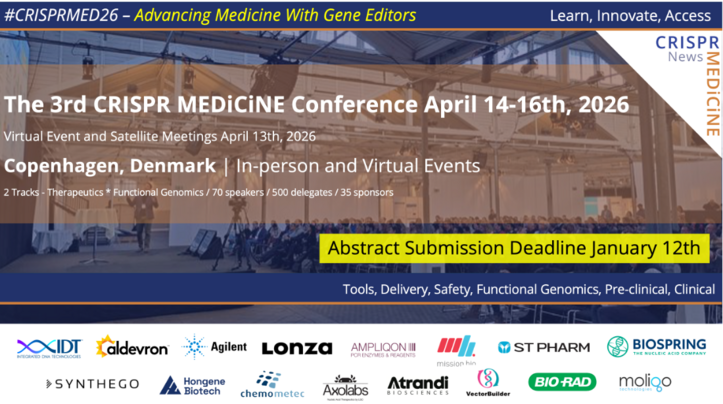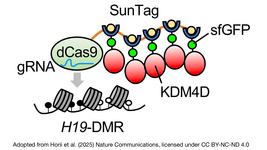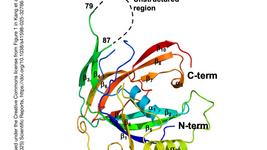CMN Weekly (21 July 2023) - Your Weekly CRISPR Medicine News
By: Gorm Palmgren - Jul. 21, 2023
CMN Intelligence - The World’s Most Comprehensive Intelligence Platform for CRISPR-Genomic Medicine and Gene-Editing Clinical Development
Providing market intelligence, data infrastructure, analytics, and reporting services for the global gene-editing sector. Read more...
Top picks
- American researchers have paved the way for a non-hormonal contraceptive pill for men. In zygotes, they microinjected CRISPR tools engineered to create mice lacking the entire coding region of Prss37, a gene required for sperm transit through the female reproductive tract and male fertility in mice. The Prss37 knock-out mice were sterile, indicating that this could eventually be a novel tool for contraceptive management.
- Chinese researchers have shown that in vivo CRISPRa-based activation of the myokines Fgf21 and Fndc5 in mice ameliorates obesity by promoting adipocytes browning. In vivo activation of myokines reduced body weight and fat mass, increased adipocyte browning and improved glucose tolerance and insulin sensitivity in diet-induced obese mice.
Research
- Dmd exon 52-54 deletion by in vivo CRISPR-Cas9-mediated exon skipping in a mouse model has demonstrated a potential new therapy for preventing early-onset cardiomyopathy. The results demonstrate the feasibility of the approach to avoid heart dysfunction in Duchenne muscular dystrophy in vivo.
- Danish scientists have used a dual intron-targeted CRISPR-Cas9-mediated strategy to disrupt the acute myeloid leukaemia (AML) RUNX1-RUNX1T1 fusion gene. The approach led to in vitro growth rate and proliferation reductions by 69% and 94% in AML t(8;21) Kasumi-1 cells.
- Chinese researchers demonstrate the feasibility of using the hypercompact Cas12f1 (only 400 to 500 amino acids) for in vivo treatment of tyrosinaemia in mice. All CRISPR components could be packaged into a single adeno-associated virus (AAV) and efficiently rescued tyrosinaemia in mice via inactivation of the Hpd gene.
- Two new CRISPR-based therapeutic approaches for Alzheimer's disease (AD) were reported at the Alzheimer's Association International Conference (AAIC) 2023 in Amsterdam. One aims to reduce the impact of the most potent Alzheimer's risk gene, APOE-e4. The other strives to reduce the production of a toxic protein in the brain, β-amyloid, a hallmark of Alzheimer's disease and the target of recently-approved treatments.
- American researchers have evaluated the effect of histone deacetylase (HDAC) inhibitors on the efficiency of the CRISPR-Cas9 system. The results indicate an enhancement in CRISPR cutting efficiency and suggest the consideration of treatment with an HDAC inhibitor in CRISPR-Cas9 genome editing protocols.
- Researchers in China have designed a minimal genome-wide human sgRNA library, H-mLib, composed of 21,159 sgRNA pairs assembled based on a dedicated selection strategy from all potential SpCas9/sgRNAs in the human genome. The H-mLib exemplified high specificity and sensitivity in identifying essential genes while containing minimal library complexity.
Industry
- SNIPR Biome has won a US patent interference case with Rockefeller University. The dispute centred on one allowed patent application owned by Rockefeller University and five patents owned by SNIPR and was declared by the US Patent Trial and Appeal Board in 2021 in Rockefeller University's favour. This ruling has now been overturned in favour of SNIPR.
- Excision BioTherapeutics has received FDA fast-track designation for EBT-101, a first-in-class CRISPR-based gene therapy candidate to cure HIV-1 functionally. EBT-101 is a potentially curative, one-time CRISPR-based treatment which makes two cuts in the integrated retroviral DNA to remove large portions of the HIV genome and prevent HIV from escaping and reproducing.
- Sangamo Therapeutics and Chroma Medicine have announced an option and license agreement to evaluate and develop zinc finger proteins (ZFP) for epigenetic editing. Under the terms of the agreement, Chroma will evaluate novel Sangamo ZFPs for specified collaboration targets outside of the central nervous system in exchange for an upfront technology access payment.
- Sangamo Therapeutics also announced a research evaluation and option agreement with Prevail Therapeutics, a wholly owned subsidiary of Eli Lilly, for novel engineered capsids. Under the terms of the global agreement, Prevail will evaluate Sangamo's proprietary capsids by performing in vitro and in vivo studies, with an option to obtain an exclusive license to use the capsids for specific neurological targets.
- Scribe Therapeutics announced a new partnership with Sanofi to develop in vivo genetic medicines for sickle cell disease (SCD). Scribe and Sanofi will collaborate to combine Scribe's proprietary CRISPR X-Editing (XE) technologies with Sanofi's targeted non-viral delivery technologies for treating and preventing genomic diseases.
- Iovance Biotherapeutics has announced the closing of a $172.5 million common stock public offering. Iovance intends to use the proceeds from this offering to fund preparations for the commercial launch of lifileucel, a one-time autologous tumour-infiltrating lymphocyte (TIL) cell therapy in patients with advanced melanoma.
Detection
- Chinese researchers have developed a field-deployable assay based on CRISPR-Cas13a for the detection of SARS-CoV-2 in wastewater. The assay is coupled with RT-RPA, is carried out in one tube, and has a detection limit of 103 copies/mL.
- A new CRISPR-Cas13a-based assay can accurately detect OXA-48 and GES carbapenemases that are involved in microbial antibiotic resistance. The assay takes less than 2 hours and exhibits 100% specificity and sensitivity.
Reviews
- Applications of CRISPR technology in cellular immunotherapy. This review discusses the development and applications of CRISPR and related gene editing technologies in immune cells, focusing on functional genomics screening, gene editing-based cell therapies, and future directions in this rapidly advancing field.
- Targeting miRNA by CRISPR/Cas in cancer: advantages and challenges. This review aims to highlight the cutting-edge approaches and challenges in cancer-gene editing therapy based on the CRISPR-Cas technology to target miRNAs in cancer therapy.
Podcasts
- In a podcast on CGTlive, Gary Owens, the associate director for gene therapy discovery at Precision Biosciences, discussed preclinical research he presented at ASGCT's 2023 conference. The talk is about the potential of ARCUS-mediated gene editing in Duchenne muscular dystrophy.
Huh, heh, wow
- In a commentary in Nature, Devang Mehta expresses his frustrations as a plant biotechnologist with the EU's strict rules on genetically modified organisms. The recently proposed new law to govern new genomic techniques (an umbrella term for technologies that include CRISPR-Cas9 gene editing) is welcomed, but more is needed. The door should be opened further because CRISPR has vast potential to boost food security in the face of pathogens and climate change.
News from CRISPR Medicine News
- On Wednesday, we reported that Caribou Biosciences had positive long-term follow-up data from the dose escalation portion of the ongoing ANTLER Phase 1 trial. The trial evaluates Caribou's lead allogeneic CAR-T cell therapeutic candidate CB-010 for treating relapsed or refractory B cell non-Hodgkin lymphoma.
To get more of the CRISPR Medicine News delivered to your inbox, sign up to the free weekly CMN Newsletter here.
Tags
CLINICAL TRIALS
IND Enabling
Phase I
Phase II
Phase III
Gastric Cancer and Colorectal Cancer, CRC, (NCT07166263)
Sponsors:
Base Therapeutics (Shanghai) Co., Ltd.
Sponsors:
Base Therapeutics (Shanghai) Co., Ltd.
IND Enabling
Phase I
Phase II
Phase III
Relapsed or Refractory Acute Myeloid Leukemia, AML, (NCT06541444)
Sponsors:
Base Therapeutics (Shanghai) Co., Ltd.
Sponsors:
Base Therapeutics (Shanghai) Co., Ltd.
IND Enabling
Phase I
Phase II
Phase III







